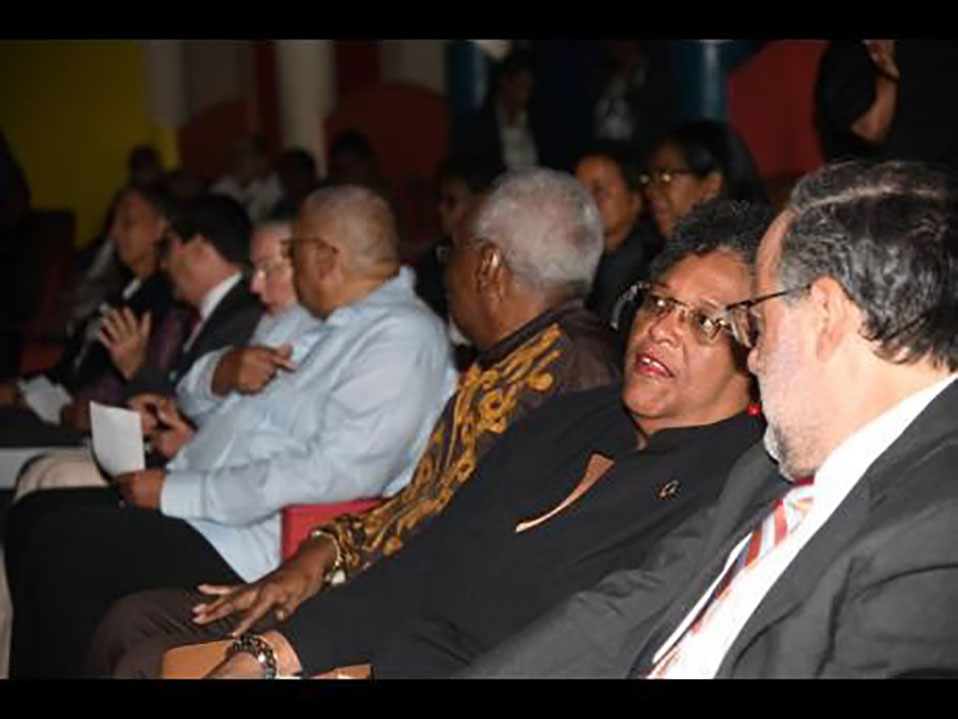(Jamaica Gleaner) Retired former Prime Minister P. J. Patterson last Tuesday praised Barbados Prime Minister Mia Mottley as the Caribbean’s fiercest advocate for social and economic justice, noting that no one since his predecessor, Michael Manley, has been as eloquent in speaking on behalf of the region.
Patterson, who succeeded Manley and served as Jamaica’s longest-serving prime minister from 1992 to 2005, described Manley as a towering political figure who not only shaped Jamaica’s political landscape, but was also a key proponent of regional integration.
According to him, Mottley – who he said “continues to provide outstanding leadership for the entire Caribbean” – has taken up Manley’s mantle, becoming a leading voice for a new world economic order, one that recognises the old system as dysfunctional and outdated.
Patterson also echoed the call for greater Caribbean unity, a sentiment recently expressed by Dr Ralph Gonsalves, the longest-serving prime minister of St Vincent and the Grenadines, who warned that unity is now more essential than ever.
Addressing the gathering at the Michael Manley Centenary Lecture at The Little Theatre in Kingston, where he also introduced Mottley as the guest speaker, Patterson also touched on the ongoing economic difficulties facing Cuba, a nation that has long contributed to the region’s healthcare and education systems and provided technical assistance across multiple fields. He acknowledged that many who once opposed Cuba – especially during Manley’s tenure (1972-1980) – for political or partisan reasons, have since come to recognise and support its contributions.
Locally, Patterson pointed to Jamaica’s consistent calls for the lifting of the US embargo against Cuba. He highlighted the detrimental impact of the 62-year-old embargo, exacerbated by the 1996 Helms-Burton Act, which has crippled Cuba’s access to essential supplies and global trade.
“It is worthy of commendation that the prime minister of Barbados, Mia Mottley, was the first to step forward and offer maximum support in a time of dire need to Cuba, to a generous neighbour,” he said, adding that he hoped others would follow her example.
Turning to the legacy of Michael Manley, Patterson reflected on how the late Jamaican prime minister understood that the nation’s economic development was shaped by the legacy of slavery and colonial exploitation.
“He deplored that iniquitous global system, which had resulted in adverse forms of trade, the absence of supreme control over our natural resources, and the denial of remunerative prices for our primary commodities,” he said.
Manley, he added, recognised that in order to address these age-old deficits, a framework had to be established to cause the voice of the Caribbean to be stronger than the sum of its individual parts.
He said Manley was one of the four architects of the Treaty of Chaguaramas in 1973, which was the push to explore common incentive policies towards investment and a common external tariff.
Citing one of the main features of the treaty – provisions that deal with the conduct of foreign policy – Patterson said nowhere was that determination for the Caribbean to chart its own course more clearly demonstrated than the “earth-shattering decision by four Caribbean heads of the independent countries in 1972 to repudiate the United States punitive embargo against Cuba and establish full diplomatic relationships with the island”.
Manley’s vision, Patterson said, was rooted in “a search for equality and the building of a just society, a cause to which he devoted his catalytic energy, his fertile imagination all eloquently couched with his persuasive oratorical mastery”.
His relentless advocacy for a New International Economic Order (NIEO), the eradication of apartheid in South Africa, ideological pluralism, and the adherence to universal international law were cornerstones of his leadership. Manley’s powerful voice resonated not only in the Caribbean but across Africa, where he stood in solidarity with those who had been exploited and oppressed by colonial powers.
“The world today renders us more vulnerable than ever than the one we knew. The existing global order is obsolete. It was fashioned by the victors of World War II. There is autocracy of the [United Nations] Security Council and impotence when a permanent member with veto powers is involved, as was on display in Ukraine, and the injustices in Gaza (the genocide of the Palestinians by Israel).
“The Bretton Woods Institutions (International Monetary Fund, World Bank, International Finance Corporation, World Trade Organisation, Multilateral Investment Guarantee Agency), which were created to help rebuild the economy after World War II and which laid the foundation for the General Agreement on Tariffs and Trade, are dysfunctional and obsolescent in facing the financial challenges that confront us today,” Patterson added.
He said new challenges have emerged with pandemics, global warming, and the advent of new technologies such as artificial intelligence.
“As Michael Manley was for the NIEO then, no one else has been more articulate than Mia Mottley for the seismic abandonment of the existing world order and a determination to include the interests of the developing world,” he said.
He praised the Barbados Initiative, conceptualised by Mottley, which seeks to overhaul the international financial framework and address issues such as mounting debt, climate change, and sustainable development for small island developing states.
As chair of the CARICOM Commission on Reparatory Justice, Mottley is also working to strengthen ties between the Caribbean and Africa, continuing the work of Manley in building global solidarity for justice and reparations.
In her address, Mottley said, in part, that the region was in a race against time, and those who doubted it would fail to prepare. Love, she said – from “The word is love”, which Manley trumpeted – was also about transformation. She argued that while the Caribbean and the world may not agree on every issue, progress can still be made through collective action and commitment to shared values.
